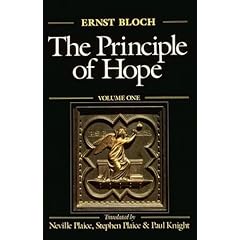by Peter Thompson
The Guardian (United Kingdom)

According to Ernst Bloch, "only an atheist can be a good Christian and only a Christian can be a good atheist." Since Bloch's death in 1977, he has been largely forgotten as a significant contributor to the debate about the role of religion in society. But in an age when theism is constantly in the news, it is time for a more considered atheistic response to the reawakening of faith than those of Richard Dawkins and Christopher Hitchens. What Bloch meant was that the Aunt Sally atheism as practised by those writers brings us no further in understanding either the historical or social roots of religion. For him it was not enough to posit religious belief as a delusion. The basis of belief, he said, rests in a social context.
So far, so Marxist. But where Bloch differed from other Marxists was in his insistence that it was not possible to simply dismiss religion as "the sigh of the oppressed creature in a hostile world" without recognising that the sigh contained the pre-illumination of a different and better world. The familiar reproach towards Marxism that it is simply a materialist version of religious belief was thus inverted by Bloch to state that, on the contrary, religious belief was always a form of social liberation which had misunderstood itself due to its historical untimeliness. Of course, the death of Marxism may partly explain the absence of Bloch's ideas from the philosophical scene, but that does not obviate the need to examine those ideas, not least because the demise of Marxism as a social alternative is arguably one of the factors which has contributed to the re-emergence of religion as a reaction to the new world order.
The resurrection of God presents a challenge to those such as Dawkins and Hitchens because they continue to perceive religion as an opiate which is handed out by states and their tame priests and mullahs in order to keep people quiet, rather than as a home-grown product consumed by people in order to dull the pain not only of global economic disadvantage but also of a deep, yet unidentifiable sense of loss. And again it is Bloch who gives us a clue as to where this sense of loss resides. In The Principle of Hope he states that what drives us forward is the paradoxical desire to find our way back to somewhere we have never been: home.
To Read the Rest of the Commentary
No comments:
Post a Comment